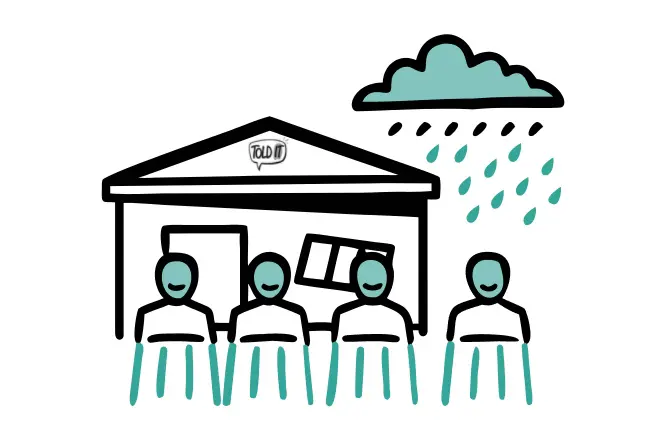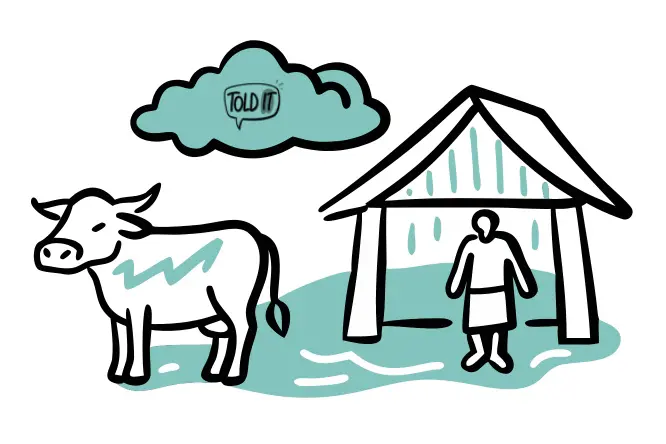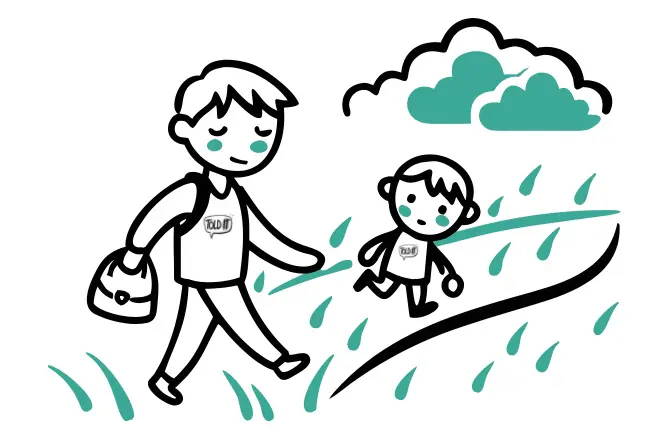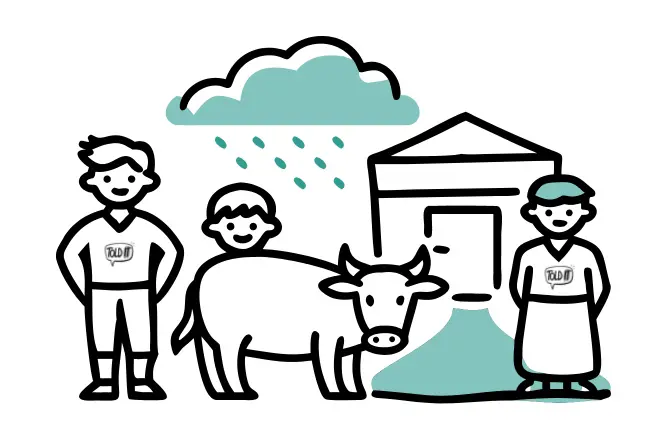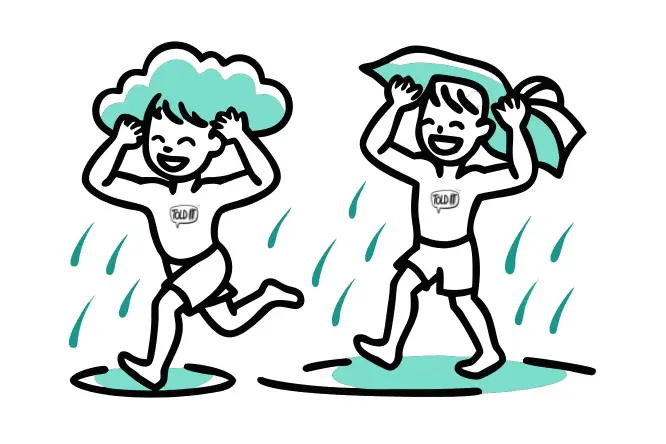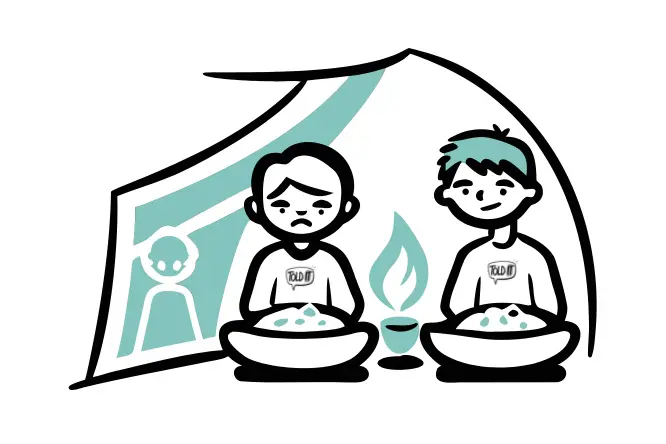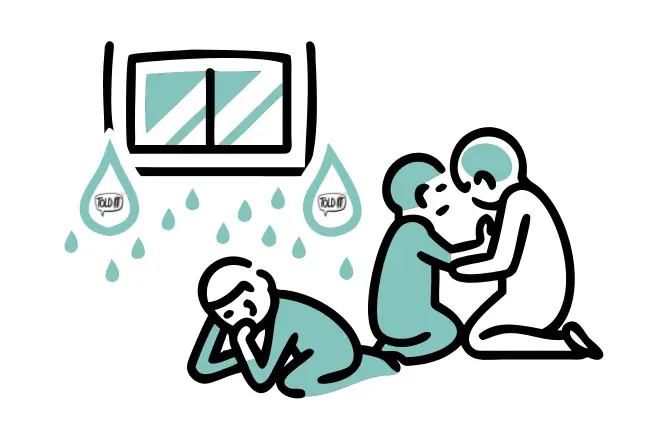The Empty Classroom
It turned out exactly as Poran had hoped.
Mr. Paresh called roll and then, with a tired smile, declared a holiday. Only six students had shown up. How could anyone expect a class with just six?
Outside, the rain had been falling since the dead of night — relentless, wild, and heavy. It drummed on the tin roof and poured down in silver sheets, blurring the whole world.
Poran’s mother had told him again and again not to go.
“Stay home today,” she had pleaded.
But Poran had stubbornly grabbed his little brother’s hand and left anyway.
He knew the school would close early. He wanted that.
This plan had been growing quietly inside his head for days. He hadn’t dared tell Ma — she would never have allowed both brothers to go out together in such weather. But Poran had a reason.
Ramu, the Third Brother
Ramu hadn’t eaten properly for days. Their little stack of hay had run out long before the month of Jaistha ended. Their roof leaked every time the clouds gathered, but still they hadn’t repaired it — because that would mean no food for Ramu.
Ma always said, “The day you were born, Poran, just a little earlier, Ramu too came into this world.”
So Ramu was like an elder brother.
Their father had died one stormy night when both boys were tiny. Since then, Ma had managed everything alone — a small patch of paddy field that barely fed them four or five months a year. The rest, nobody knew how she made do.
Poran grew up watching Moni Jethu, their kind neighbor, take Ramu to the fields. Ramu plowed other people’s lands too, earning a few coins here and there. But now, he was old. His ribs showed, his legs trembled, and he could barely stand.
Last year, Jamshed Chacha from the next village came asking to buy Ramu. Ma couldn’t do it. She couldn’t let him go.
Neither could the boys.
They couldn’t imagine a day without Ramu in their lives.
A Secret Plan
On his way to school, Poran had seen tender new grass growing along the edge of the rice fields — soft, green, glistening with rain. Perfect for Ramu.
But Ramu couldn’t be taken out right now; the farmers had sprayed fertilizer, and no animals were allowed on the wet soil.
So, Poran made a plan.
If school ended early, he and Naran would gather a big bundle of grass and bring it home. That would keep Ramu happy for a few days.
That’s why he’d insisted on going to school — dragging Naran, who was in Class Five, along with him.
“If we can do this a few times,” he’d told himself, “the rainy season will pass easily. Ramu won’t have to go hungry.”
The Twin Bulls
Poran was in Class Seven. The two brothers were known in the village as “the Twin Bulls.”
Even their mother said it often, half-proud, half-tired:
“As long as I have my bull pair, what do I have to fear?”
But Poran knew the truth. Ramu wasn’t just a bull. He was family.
So he had packed an old torn sack in his schoolbag — perfect for carrying grass. He felt strangely happy that morning, even in the storm.
Through the Fields
“Where’s Naran?” Poran muttered, peering down the empty lane. Then he saw him — a small figure running through the rain, barefoot, smiling wide.
“Dada! Let’s go to the western field. The grass there’s taller!”
The two brothers ran, splashing through puddles, laughter echoing through the rain. By the time they stopped, the day had half slipped away.
“Ma must be worried,” Poran said, glancing at the dark clouds. “Never mind — we’ll make up something.”
Naran carried Poran’s schoolbag, while Poran hoisted the sack full of wet grass on his head. Naran’s little hands had turned red from pulling out the sharp, slippery blades. But he didn’t complain. Neither did Poran.
They were happy.
Because today, Ramu would eat.
After years of feeding them by plowing others’ fields, today they were repaying a debt.
A Small Lie
As they walked home, Naran said thoughtfully,
“Dada, if Ma asks why we’re late, say we had our mid-day meal at school.”
Poran frowned. “Do they serve meals on a rainy day, fool?”
Naran giggled. “She won’t check, will she? And you heard her — there’s no food left at home.”
Poran fell silent.
He remembered the night before — Ma’s hand on his head, her eyes glistening as she whispered,
“Tomorrow’s your birthday, my boy… but what can I give you?”
He had seen her quietly wipe her tears with the edge of her sari.
Yes, it was his birthday. And Ramu’s too.
Before leaving, he’d told her,
“Don’t worry, Ma. Everything will be alright today. I’ll eat at school. You rest.”
They hadn’t eaten since morning. Their stomachs ached from emptiness. But Poran didn’t care. He could already picture Ramu munching happily on the fresh green grass. That thought alone made his heart full.
Home
Before they knew it, they were home.
Ma was waiting by the pond, drenched from the rain. She called out,
“School ended long ago! Where have you two been? Come inside, quick!”
Poran had planned to sneak the grass into the cowshed before she saw. But it was too late.
She must have guessed everything — that they had gone knee-deep into flooded fields, risking snakes and leeches. Still, she said nothing.
Her face was pale. Too pale.
Poran slowly walked to the cowshed and set the heavy sack down.
“Where’s Ramu, Ma?” he asked softly.
“The rain stopped for a while,” she said quietly. “I tied him under the tree.”
Poran couldn’t wait another second. “Let me give him the grass first!”
But Ma stopped him.
“Later. First, you eat. You haven’t had anything since morning.”
“No, Ma,” he protested. “Let Ramu eat first.”
This time, her voice was firm.
“Eat first!”
Poran didn’t argue again. He washed his hands and sat down beside his little brother.
The Bowls of Sweetness
Ma brought two small clay bowls and placed them before them.
Poran blinked. Then rubbed his eyes.
Payesh.
Sweet, milky rice pudding.
Yesterday, there hadn’t been a single grain of rice in the house.
Where did this come from?
Naran squealed with delight.
“Payesh! You made payesh, Ma! It’s Dada’s birthday! We’ll eat lots! And Ramu too!”
The Truth
Ma froze. The strength in her body melted away. Tears she had been holding back for hours began to fall — one after another, silently.
She grabbed the bamboo pole for support and sank to the floor.
Poran’s chest tightened. His voice trembled.
“Ma… tell me the truth. Where’s Ramu? Bring him to me.”
She looked at her sons through tear-filled eyes and whispered,
“Ramu’s gone… He won’t come back… ever again.”
The world went still.
The rain outside felt louder than ever.
Poran’s throat burned. He wanted to shout —
“We could’ve gone hungry, Ma! We would’ve managed! Why… why did you—”
But no words came.
Only the sound of rain filled the silence —
crying for all of them.

